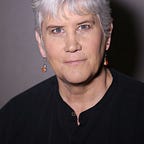Gaijin English
“You can’t really hear the difference between bat and vat, can you? You just know the difference from context, right?”
This question was asked by a 28-year old Japanese student during an English class I taught several years ago in Japan. He was clearly illustrating a common phenomenon I’ve observed: When a person can’t hear something, he or she imagines no one else can hear it either.
“No, I really can hear the difference,” I insisted.
In my classes, I used music, word games, and neurolingistic programming to teach English. In Japan, I learned how much motivation can vary from student to student and that opportunities influence our abilities to learn, to hear, and to listen.
I also learned everything you could want to know about soy sauce production. One of my gigs was teaching English to Kikoman Soy Sauce managers heading to Singapore to set up a new factory. I also met a Chinese woman from Hong Kong. After we had been speaking for awhile, she mentioned that English was her first language. Hearing her speak, I couldn’t imagine this to be true, but it turned out she had learned it from her Filipino nanny, for whom English was a second language.
During my three years teaching in Japan, I also worked with Taisei Construction businessmen. These men studied intensively to improve their spoken English. They would soon be heading to Saudi Arabia to work for a year at a time, living away from their wives and families. Some of them tried awfully hard to fail, because they thought if they failed English class, the company wouldn’t send them abroad. They were wrong.
And then there were the six months I spent in remote Kamaishi, Iwate-Ken, teaching bright young graduates of Tokyo University working on their first assignments for Shinitetsu, or Japan Steel. Each of them hoped to be transferred back to the big city as soon as possible. Interac, the English-teaching company I worked for, sent me to Kamaishi because I speak Japanese — not that the company required knowledge of Japanese in order to teach. No, they sent me specifically in the hopes that having some abilities in the local language would keep me from going crazy — and to avoid further embarrassment. Let me explain.
The only other foreigner in the small fishing village, population 40,000 was a man from India who had married a Japanese woman. Pretty much no one in the village spoke English other than my students employed by Japan Steel, and this isolation had caused the previous English teacher to drink himself into a stupor, lock himself in his apartment, and cause a scene.
In addition to avoiding going crazy, I had wonderfully interesting opportunities. One highlight was translating for the Sri Lankan ambassador to Japan. He was in this part of rural northern Japan on a mission to help improve eye health in Sri Lanka. I had never done simultaneous translation, but the audience patiently waited as I figured out how to translate the ambassador’s words, which were not only spoken in accented English, but they were from a medical field I knew nothing about.
In my huge, company-provided Kamaishi apartment books lined the floor. I filled my days with reading and teaching, with hikes through the beautiful countryside, and by making origami dolls with the woman next door. I also visited the 100-foot high deity, Kuan Yin, who held a fish while standing to face the Pacific Ocean.
My time in the village was a chance to turn inward, to connect with nature, and to consider what it means to be an insider versus an outsider — and why we divide ourselves into groups.
After a while, the children in Kamaishi got to know me and stopped yelling “Gaijin! Gaijin!” every time I walked to the store or to the bowling alley or to work. Gaijin doesn’t only mean ”foreigner.” The literal translation is “outside person.” There was no hiding my foreignness.
Sometimes it was helpful to stand out as a foreigner. I always got rides when I hitchhiked, usually by people wanting to practice their English. Once I was picked up by a man who had passed me going the opposite direction. He stopped, did a U-turn, and came back to ask, ”Where are you going?” When I told him, he thought for a minute and said, “I can take you and still get back to work on time.” He diligently practiced his English while driving me in the opposite direction to his destination.
One time I brought a baby gift to a friend — at least I consider her a friend. A few weeks later I got a picture of myself holding the baby, and on the back she had written, “Congratulations, you are the first foreigner to hold my baby.”
Originally published at http://authorsonshow.com/non-fiction on November 08, 2011.
